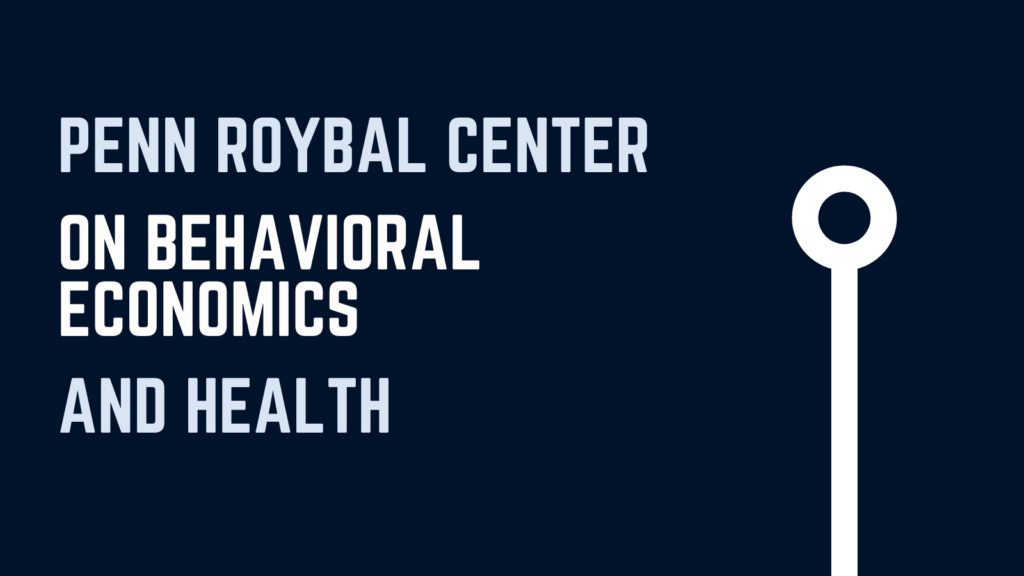The Penn Roybal Center on Behavioral Economics and Health
The goal of the Roybal Center is the translation and integration of basic behavioral and social research findings into interventions to improve the lives of older people.


About the Roybal program
The goal of the Roybal program is to translate and integrate basic behavioral and social research findings into interventions that improve the lives of older people while strengthening the capacity of institutions to adapt to societal aging. Roybal Centers are structured within the conceptual framework of the multidirectional and translational NIH Stage Model to produce potent and implementable, principle-driven behavioral interventions.
In 2009, CHIBE investigators successfully competed for NIH funding to establish what was then one of two NIH Centers on behavioral economics and health (now the Penn Roybal Center on Behavioral Economics and Health), and CHIBE’s Center has been renewed consistently since then.
A multidisciplinary team of researchers from the University of Pennsylvania, Carnegie Mellon University, and other universities comprises our Roybal Center. Scientists from the fields of medicine, economics, psychology, statistics, law, epidemiology, and other disciplines work together to design interventions.
The NIA’s Division of Behavioral and Social Research supports several Roybal Centers across the nation, as well as a Coordinating Center.
Challenges our Roybal Center seeks to address
There have been significant and notable successes in using behavioral economics strategies to improve health behavior and health care value. However, some of the most efficacious interventions experience substantial voltage drops in effectiveness trials, and many promising ideas fail to scale.
The stakes are high. The United States (US) has the lowest life expectancy among peer countries despite higher health spending. The US obesity rate (38%) is the highest in the OECD, driven in part by poor dietary quality. Yet, the country’s health system emphasizes diagnosis and treatment over prevention, with 97% of health care dollars spent treating acute illness. To improve population health and reduce premature mortality, we need effective and cost-effective behavior change interventions, new ways to leverage existing healthcare system capabilities, and, crucially, approaches that work in the real world and not just in research studies.
Our Roybal Center leadership team continues to push the frontiers of understanding how decision errors such as myopia, insensitivity to probabilities, and status quo bias both drive unhealthy behaviors and can be leveraged in interventions to improve health.
Overall goal
The goal of our Roybal Center is to increase the pace and reach of scientific discovery to deliver impactful behavioral economics interventions at scale.
Specific aims
1) Facilitate and support research across the NIH Stage model that advances the translation of behavioral economics concepts to improved health and health behaviors for older adults (Stages 0-V)
2) Cultivate testing of mechanisms of behavior change and early-stage feasibility pilots (Stages 0-I)
3) Support testing of promising Stage I ideas with potential to improve health at scale in research and community settings (Stages II-IV)
4) Collaborate with external health care organizations to disseminate our findings and support the implementation of effective interventions (Stage V)
Ongoing research and projects
You can learn more about our Center’s research here. Find seminars and webinars on our events page, and find CHIBE publications here. Read about our most recent Roybal Retreat here.
Why is it called the “Roybal” Center and “Roybal” Retreat?
Our Roybal Center and the annual retreat CHIBE holds each year called the Roybal Retreat are in honor of Congressman Edward R. Roybal, the first Latino elected to Los Angeles City Council in 1949. Roybal co-founded the House Select Committee on Aging and was awarded the Presidential Medal of Freedom by President Barack Obama in 2014 posthumously.
Collaborate with Us
Interested in collaborating with CHIBE on a project? Get in touch with us to learn more about how we can work together.